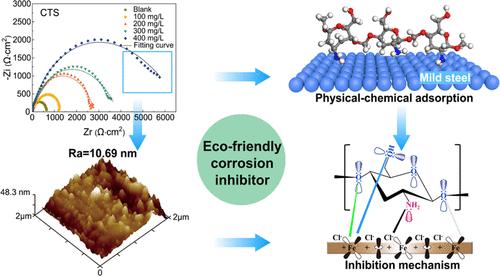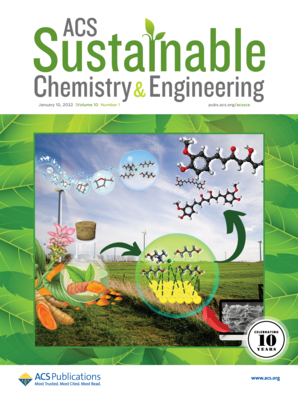生态友好型缓蚀剂对低碳钢在模拟混凝土孔隙溶液中的缓蚀效果及机理:实验与理论研究
IF 7.3
1区 化学
Q1 CHEMISTRY, MULTIDISCIPLINARY
引用次数: 0
摘要
从甲壳类动物外骨骼、当归、香草豆、氨基酸等中提取的天然生物基材料作为生态友好型缓蚀剂具有很大的潜力。本研究提出了几种环保材料(壳聚糖(CTS)、阿魏酸(FA)、半胱氨酸(Cys)和蛋氨酸(Met))作为缓蚀剂来提高钢的耐腐蚀性。通过电化学、表面测量、量子化学(QC)计算和分子动力学(MD)模拟,评价了它们在模拟混凝土孔隙(SCP)溶液中的抑制效果和机理。结果表明,这些缓蚀剂有效地提高了钢的耐蚀性,特别是对CTS的耐蚀性(最大缓蚀率为92.6%)。这些抑制剂的吸附遵循Langmuir和Freundlich吸附等温线,呈现出物理-化学混合吸附模式。表面表征技术表明,这些抑制剂形成的保护层可以有效地抑制钢的腐蚀。QC计算和MD仿真进一步证实了实验结果。水泥砂浆性能测试表明,这4种抑制剂对新砂浆的和易性没有影响,反而提高了砂浆试件的强度,最大抗压强度提高了11.18%。本研究对今后提高钢筋混凝土耐久性具有重要意义。本文章由计算机程序翻译,如有差异,请以英文原文为准。

Corrosion Inhibition Effect and Mechanism of Eco-Friendly Corrosion Inhibitors on Mild Steel in Simulated Concrete Pore Solution: Experimental and Theoretical Studies
Natural biobased materials, which can be obtained from crustacean exoskeletons, angelica sinensis, vanilla beans, amino acids, etc., have significant potential as eco-friendly corrosion inhibitors. In this study, several eco-friendly materials (chitosan (CTS), ferulic acid (FA), cysteine (Cys), and methionine (Met)) were proposed as corrosion inhibitors to improve the corrosion resistance of steel. Their inhibition effects and mechanisms in simulated concrete pore (SCP) solution were evaluated by electrochemical, surface measurements, quantum chemical (QC) calculations, and molecular dynamics (MD) simulations. The results showed that these inhibitors effectively improved the corrosion resistance of steel, especially for CTS (with a maximum inhibition efficiency of 92.6%). The adsorption of these inhibitors followed Langmuir and Freundlich adsorption isotherms, revealing the physical–chemical mixed adsorption modes. Surface characterization techniques revealed that the protective layers formed by these inhibitors could effectively inhibit the corrosion of the steel. QC calculations and MD simulations further confirmed the experimental results. Performance of cement mortar measurements revealed that these four inhibitors exhibited no effect on the workability of fresh mortar and improved the strength of mortar specimens, with a maximum increase in the compressive strength of 11.18%. This study is of great significance to improving the durability of reinforced concrete in the future.
求助全文
通过发布文献求助,成功后即可免费获取论文全文。
去求助
来源期刊

ACS Sustainable Chemistry & Engineering
CHEMISTRY, MULTIDISCIPLINARY-ENGINEERING, CHEMICAL
CiteScore
13.80
自引率
4.80%
发文量
1470
审稿时长
1.7 months
期刊介绍:
ACS Sustainable Chemistry & Engineering is a prestigious weekly peer-reviewed scientific journal published by the American Chemical Society. Dedicated to advancing the principles of green chemistry and green engineering, it covers a wide array of research topics including green chemistry, green engineering, biomass, alternative energy, and life cycle assessment.
The journal welcomes submissions in various formats, including Letters, Articles, Features, and Perspectives (Reviews), that address the challenges of sustainability in the chemical enterprise and contribute to the advancement of sustainable practices. Join us in shaping the future of sustainable chemistry and engineering.
 求助内容:
求助内容: 应助结果提醒方式:
应助结果提醒方式:


